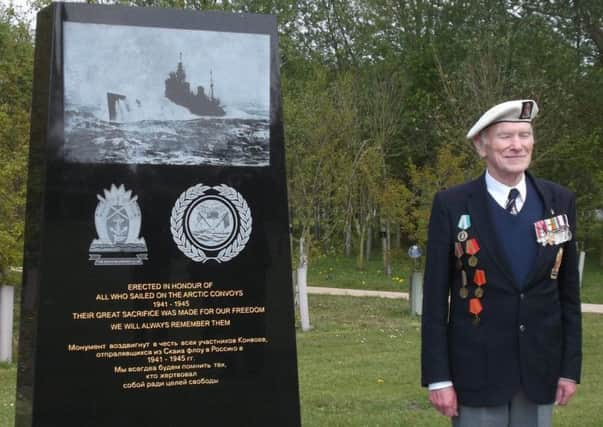Obituary: Kenneth Reith RN MBE


Kenneth Reith RN MBE. Lieutenant Commander and Arctic Convoy veteran.
Born: 12 March, 1927 in Essex
Died: 7 November, 2015, in Kirkcaldy aged 88
When Kenneth Reith signed up to join the Royal Navy he was still only 15 and the Second World War was at its height. Nazi forces had surrendered at Stalingrad, the Allies had been victorious in North Africa and a brutal campaign was still being fought in the jungles of Burma.
Advertisement
Hide AdAdvertisement
Hide AdBut in the bitter Arctic Ocean a different sort of battle was ongoing – to deliver supplies to the Russian allies, blockaded by Germany and cut off from the rest of the world, via the ports of Murmansk and Archangel. It was into these Russian Arctic Convoys, known by the courageous sailors who manned them as Suicide Missions, that the teenage naval recruit would soon be thrust.
Churchill called it “the worst journey in the world”, thanks to the bone-chilling temperatures and horrendous conditions suffered by the crewmen, whose vital voyages were the constant target of harassing Luftwaffe and U-boats determined to prevent supplies getting through.
Reith was 17 when he served as a signalman on HMS Diadem, a light anti-aircraft cruiser, escorting the convoys of merchant ships loaded with ammunition and supplies en route to Russia, in 1944-45.
The volume of goods transported by the vulnerable stream of vessels was astonishing and included 7,411 aircraft, 4,932 anti-tank guns and 5,218 tanks. But the cost to the Allies was shocking – many ships were lost and 3,000 men died at sea, their bodies never recovered. Seventy-eight convoys made the perilous journey, 19 of them from Loch Ewe in Wester Ross, others from the Clyde.
For young Reith, his role as signalman was particularly important as all manoeuvres and messages had to be sent by flags or morse light code as radio signals would be picked up by the enemy.
Decades later he would recall his experiences for the Russian Arctic Convoy Museum Project, explaining: “Over the four convoys I participated in we were lucky for the first two convoys as we had no casualties, possibly because the atrocious weather conditions were unsuitable for the enemy to attack, but our luck ran out on the third convoy, JW 65, when we were attacked by six U-boats.”
That was on 20 March, 1945 and the corvette Lapwing and two American merchant ships were sunk. But an even bigger enemy task force was poised to strike on their next mission.
“On the next convoy nine U-boats were waiting for us off the entrance to Kola but we managed to avoid them by the subterfuge of sending four destroyers firing pyrochtecnics to simulate the convoy by the normal route while we got away through a channel in the minefield which the Russian minesweepers had cleared. The ruse was successful as we got away without any casualties”.
Advertisement
Hide AdAdvertisement
Hide AdReith, remained in the Royal Navy for another 40-odd years, rising to the rank of Lieutenant Commander, and continuing his association with the sea through work with cadets and as a resettlement officer, earning a military MBE in the New Year’s honours list in December 1981.
Born in Essex, he never knew his mother and was brought to the North-east of Scotland by his father, an Aberdonian, when he was just weeks old. Raised by his grandmother, who died when he was still in primary school, he decided as a young teenager to join the Royal Navy. Accepted just before his 16th birthday, he found he loved the service and it became his life.
He rose through the ranks, serving on numerous ships, often covering the same routes several times. When he retired he decided to travel more widely and visit places he had not previously had the opportunity to see. He particularly enjoyed trips to St Petersburg and would normally spend Christmas and New Year in Tenerife.
In May 2013 he, along with his dwindling band of convoy colleagues, finally received recognition in the form of an Arctic Star medal, another long and hard-fought battle. He was among 40 veterans who were presented with the award at a ceremony in Poolewe. Then in November last year he was honoured by Russia with the Ushakov Medal, presented in Edinburgh by consul general of the Russian Federation, Andrey Pritsepov.
This summer his story featured among those of 16 veterans at an Edinburgh Fringe exhibition at St Mary’s Episcopal Cathedral, Edinburgh, which hosted the event with Legion Scotland. He was pictured at the Men And Ice exhibition delightedly sharing a salute with a fellow HMS Diadem colleague whom he had not seen for 70 years.
By that time he was suffering from mesothelioma, a form of cancer of the lung’s lining, that may have stemmed from exposure to asbestos during his naval career. After the diagnosis Lt Cdr Reith, who had been divorced once and widowed once, brought forward his wedding to his sweetheart Frances Anderson.
The couple had met by chance at a singles dance in the Solo Club in Stirling ten years earlier and married in a secret ceremony in Dunfermline last February, surprising family and friends. They had planned a honeymoon at sea on a cruise and a trip to New Zealand but the groom’s illness prevented the trips.
Positive to the end, he had big plans to see his 90th birthday but died peacefully in hospital in Kirkcaldy, at the age of 88. Lt Cdr Reith, who lived in Dunfermline, is survived by his wife Frances and his son and daughter.
ALISON SHAW